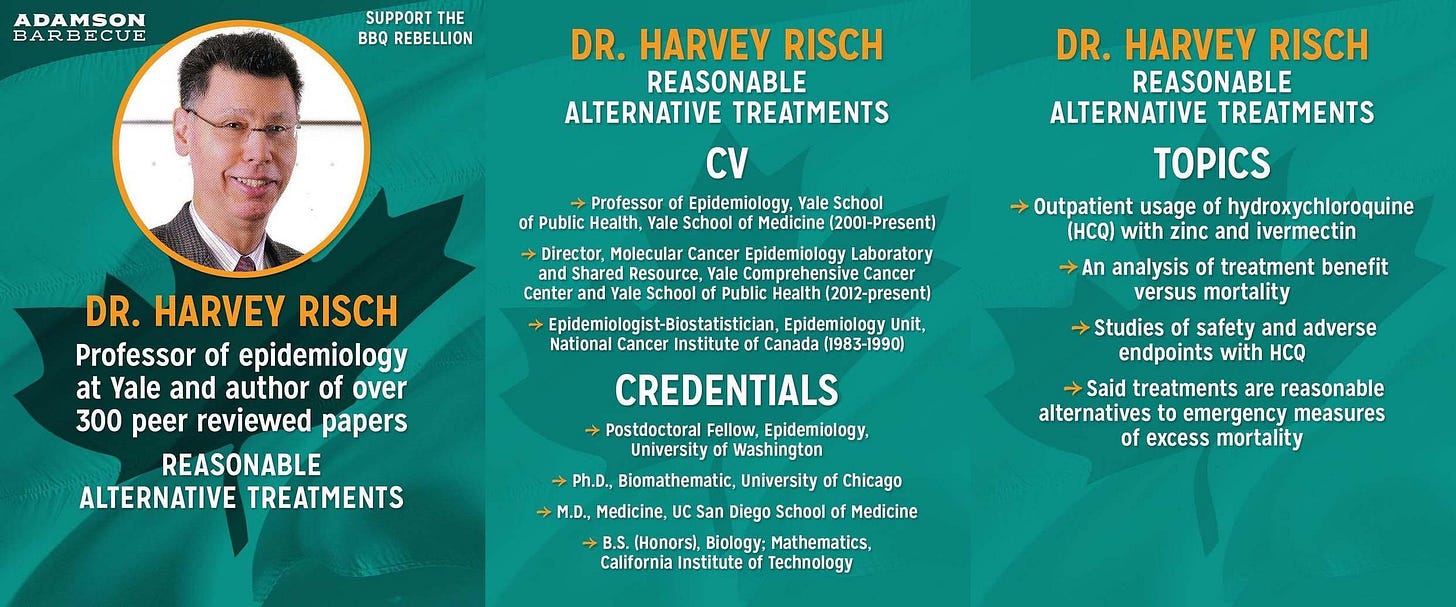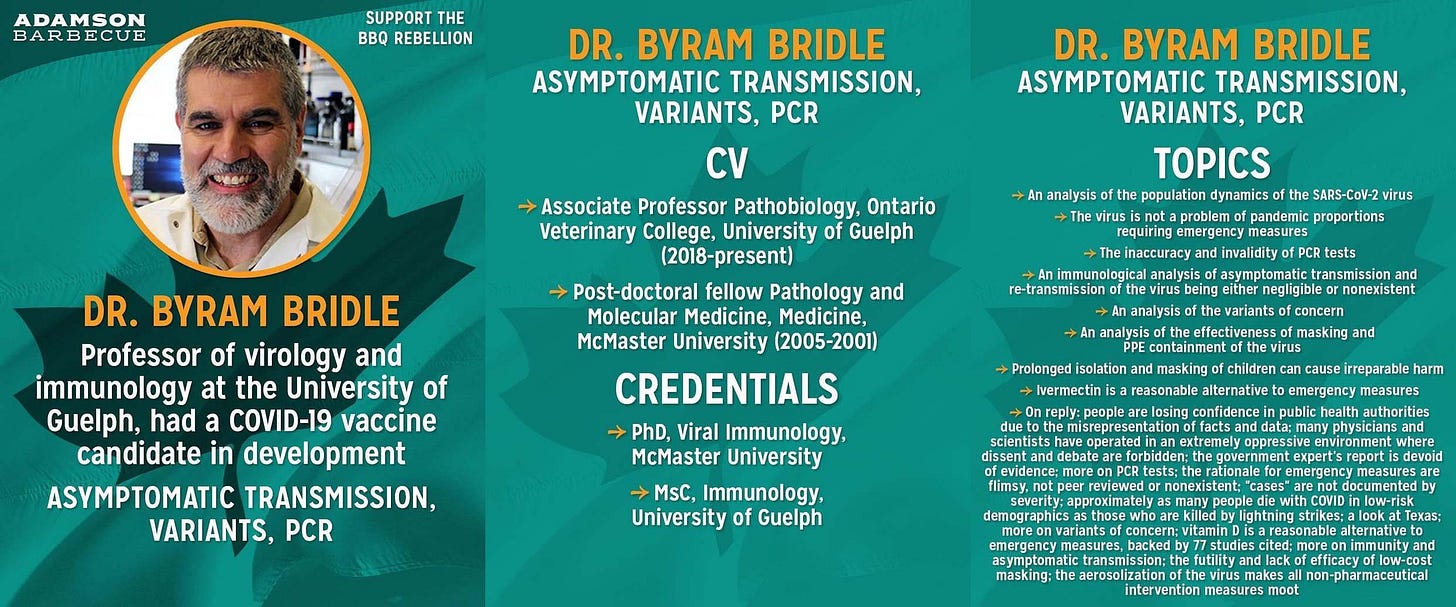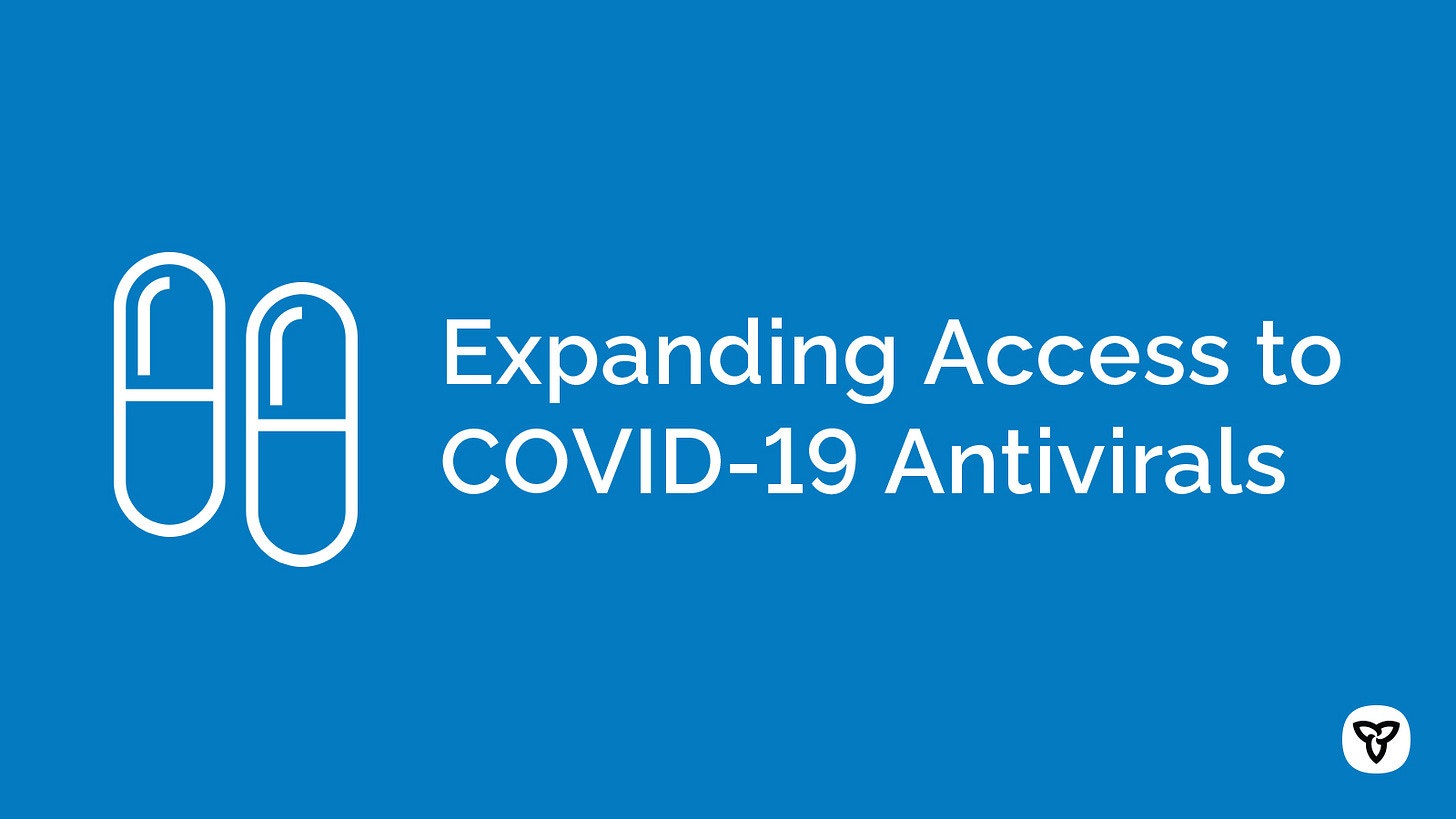Stick A Fork In It: Treatments & Immunity
TL;DR - The simplest solutions are almost always the best
With the advent of covid and the healthcare system on life support, it made sense that authorities would want to keep patients out of hospitals. Then again, it always makes sense for people to be healthy and avoid hospitals. To that end, a quality diet, active lifestyle, social connectiveness, and exposure to the natural world are all essential for a strong body, mind, and immune system. On occasions when medical interventions are necessary, early treatment is a crucial tool in any doctor’s toolbox. Treating sickness before it progresses to critical stages can alleviate the burden on under-performing healthcare institutions and lessen the duration of patient suffering.
In certain circumstances, doctors are permitted to prescribe “off-label” (not for original or intended purpose) medicines. Dealing with an unknown quantity such as covid surely should have qualified. For patients experiencing severe symptoms, responsibly administering readily available, cost-effective drugs with anti-viral properties and strong safety track records should have been a no-brainer. Even if efficacy was not well defined, the potential benefits as a countermeasure to covid – a novel coronavirus – clearly would have outweighed the risks.
One such candidate was hydroxychloroquine (HCQ), which gained prominence in March 2020 after then-President Donald Trump was prescribed the drug by his doctors to treat his case of covid. However, less than two weeks after the FDA granted HCQ Emergency Use Authorization (EUA), two former FDA commissioners complained that using it would hurt ongoing clinical trials; an illogical excuse that prioritized politics over lives and pre-emptively dismissed positive developments documented by renowned scientists. Just two months later, in June 2020, the FDA reversed course and revoked the EUA, claiming HCQ was unlikely to be effective and accusing it of having serious side effects. Regarding its efficacy against covid, the evidence may not yet have been conclusive, but it was undeniable that there were positive signs – that’s why it received emergency approval in the first place. As for safety, HCQ has been an FDA-approved drug since 1955. That’s a 68-year track record. It is so safe that the WHO includes HCQ on its List of Essential Medicines. For the FDA to suddenly suggest without strong evidence that HCQ had serious side effects seemed disingenuous, and it raised more questions than it did provide answers.
“I think that the FDA has learned nothing. The modus operandi of the agency is that they talk a good game and then nothing happens… The lack of insight that continues to be exhibited by the agency is in many ways a willful blindness that borders on the criminal.”
– Dr. Raeford Brown, Chair of the FDA’s Opioid Advisory Committee. January 24, 2019.
According to testimony by Dr. Harvey Risch, professor of epidemiology at Yale University, an expert witness who submitted evidence on behalf the Barbecue Rebellion constitutional challenge to the Ontario Superior Court, when it comes to the safety of HCQ, “the FDA has no systematic evidence of fatal adverse events from hydroxychloroquine prophylaxis or outpatient treatment use and has invalidly used evidence in hospitalized inpatients to create a false public warning by extrapolating to outpatient use.” As for the FDA’s claims of inefficacy, he wrote that “the RCT studies proclaimed supposedly as definitively showing no benefit of HCQ use in outpatients have all involved almost entirely low-risk subjects with virtually no hospitalization or mortality events and are uninformative and irrelevant for bearing upon these risks according to HCQ use in high-risk outpatients.” Having accounted for this oversight, he stated that “it is readily apparent that every one of the studies of high-risk outpatient HCQ use has shown 2-fold or better risk reduction for hospitalization or mortality, and that the numerous systematic case-series studies have shown exceedingly good treatment benefit vs mortality.” Based on this, he concluded that “the improper warning on the FDA website must be removed immediately, and widespread early outpatient treatment must start immediately.” Given that, as of February 2023, a real-time tracker of HCQ results spanning 382 studies shows it consistently yielded positive outcomes when used as an early treatment, Dr. Risch’s allegations about the FDA’s erroneous conclusions warrant further investigation.
Even more polarizing than HCQ was ivermectin (IVM). Discovered in 1975 by Dr. Satoshi Omura and approved for human use in 1987, it was hailed has a miracle discovery for its incredible anti-parasitic properties. In 2011, Dr. Omura wrote, “there are few drugs that can seriously lay claim to the title of ‘Wonder drug’, penicillin and aspirin being two that have perhaps had greatest beneficial impact on the health and wellbeing of Mankind. But ivermectin can also be considered alongside those worthy contenders, based on its versatility, safety and the beneficial impact that it has had, and continues to have, worldwide.” This sentiment was echoed in a 2017 Nature study, which praised IVM’s versatility, saying “today, ivermectin remains a relatively unknown drug, although few, if any, other drugs can rival ivermectin for its beneficial impact on human health and welfare.” For discovering and developing IVM, Dr. Omura and Dr. William C. Campbell were awarded the Nobel Prize in medicine in 2015. It is also on the WHO’s List of Essential Medicines.
“Ivermectin is highly effective against a range of parasites, has limited side effects and is freely available across the globe… Treatment is so successful that these diseases are on the verge of eradication, which would be a major feat in the medical history of humankind… The global impact of their discoveries and the resulting benefit to mankind are immeasurable.”
What does an anti-parasitic ‘wonder drug’ have to do with covid? Among its many healing capabilities, IVM happens to have strong anti-viral properties. According to the same 2017 Nature study, “ivermectin has also been demonstrated to be a potent broad-spectrum specific inhibitor of importin α/β-mediated nuclear transport and demonstrates antiviral activity against several RNA viruses by blocking the nuclear trafficking of viral proteins.” The study also touted IVM’s noteworthy anti-bacterial and anti-cancer properties, but that’s another story altogether.
According to another expert witness, Dr. Byram Bridle, professor of virology and immunology at the University of Guelph, who reviewed the available literature on IVM in his April 2021 affidavit, “Canada should include ivermectin for early out-patient treatment for COVID-19,” because there are “multiple clinical trials from different countries saying the same thing, that the treatment works, both in the early and late stages of the disease.” Since then, there have been two meta-analyses published in the American Journal of Therapeutics supporting its efficacy against covid – one in June 2021 and one in August 2021 – and IVM is endorsed by Dr. Paul Marik, the most published practicing intensivist in the world. A real-time tracker of ivermectin results, which includes 95 studies as of February 2023, indicates that “statistically significant improvements are seen for mortality, ventilation, ICU admission, hospitalization, recovery, cases, and viral clearance.”
What does an anti-parasitic ‘wonder drug’ have to do with covid? Among its many healing capabilities, IVM happens to have strong anti-viral properties. According to the same 2017 Nature study, “ivermectin has also been demonstrated to be a potent broad-spectrum specific inhibitor of importin α/β-mediated nuclear transport and demonstrates antiviral activity against several RNA viruses by blocking the nuclear trafficking of viral proteins.” The study also touted IVM’s noteworthy anti-bacterial and anti-cancer properties, but that’s another story altogether.
According to witness Dr. Byram Bridle, professor of virology and immunology at the University of Guelph, who reviewed the available literature on IVM in his April 2021 affidavit, “Canada should include ivermectin for early out-patient treatment for COVID-19,” because there are “multiple clinical trials from different countries saying the same thing, that the treatment works, both in the early and late stages of the disease.” Since then, there have been two meta-analyses published in the American Journal of Therapeutics supporting its efficacy against covid – one in June 2021 and one in August 2021 – and IVM is endorsed by Dr. Paul Marik, the most published practicing intensivist in the world. A real-time tracker of ivermectin results, which includes 95 studies as of February 2023, indicates that “statistically significant improvements are seen for mortality, ventilation, ICU admission, hospitalization, recovery, cases, and viral clearance.”
To be clear, neither HCQ nor IVM are panaceas that could magically eradicate all traces of covid from the earth. They are simply low-risk medications that are essential to global health, inexpensive to produce, and which if used correctly, potentially could have prevented much suffering, hospitalization, and death. But for reasons that defy logic, both the FDA and the WHO actively discouraged their use, and the media shamelessly smeared their stellar reputations.
Meanwhile, the track record of the FDA in recent years has failed to inspire confidence in their oversight capabilities. They failed to stop the opioid epidemic. They needlessly delayed and were careless in their response to baby formula issues. And appallingly, they approved a drug for Alzheimer’s disease even though it was shrouded with controversy, in addition to major revelations mere months earlier suggesting that the drug’s mechanism of action was based on fabricated research. In light of the many avoidable omissions and misleading conclusions peddled by both the media and regulators throughout covid, it behoves those formerly trustworthy institutions to stop horsing around and start acting like impartial investigators once again, presenting balanced perspectives to the public and empowering them to make informed decisions.
“As experience accrued in treating COVID-19 infections, physicians worldwide discovered that high-risk patients can be treated successfully as an outpatient… with a “cocktail” consisting of hydroxychloroquine, zinc, and azithromycin (or doxycycline)… based on the pharmacology of the hydroxychloroquine ionophore acting as the “gun” and zinc as the “bullet,” while azithromycin potentiates the anti-viral effect. Undeniably, the hydroxychloroquine combination treatment is supported by science.”
It has long been known that physical activity lowers the risk of severe outcomes from covid. However, most people rely on team sports and communal facilities for regular exercise, and those were all closed during lockdowns. This is just one more example of how so-called health policies were in direct conflict with desirable health outcomes, and it is likely why authorities were remiss to mention it while restrictions were in place. However, one thing authorities easily could have commented on was the role of vitamin D for immune support. Vitamin D is critical to overall health, especially for Canadians who are chronically vitamin D deficient. It is a ubiquitous vitamin that is widely available as a supplement, can be gained via sun exposure, and is bioavailable in many common foods. And yet, not only did they fail to mention it, but in April 2021 federal health minister Patty Hajdu childishly referred to vitamin D as “fake news.” To date, there have been hundreds of studies showing that vitamin D works to improve outcomes, and as of February 2023, a large study in Nature and a definitive meta-analysis seem to have ended any lingering doubt about it.
Looking at the big picture for treatments, what HCQ, IVM, and vitamin D have in common is that they are generic drugs, which are inexpensive and barely profitable for pharmaceutical companies. With no patent-protection, there is no corporate interest in them, and no influential lobby to advocate for trials and approvals. The opposite is true for costly drugs like remdesivir, made by Gilead Sciences.
Despite remdesivir’s lofty price tag of $3,100 per treatment course; despite an initial study into its use against covid in April 2020 resulting in 31% of participants suffering serious adverse events, including septic shock and multiple organ failure; despite the primary benefit of a subsequent larger study being relatively marginal, alleging only to improve time to recovery; despite that large study being untrustworthy because the endpoint was changed midway throughfrom improvement in mortality to time to recovery; despite a massive study from October 2020 that caused the WHO to conclude it had “no meaningful effect on mortality or other important outcomes”; despite a disproportionately high volume of reports indicating acute injuries to the liver and kidney; despite no indications that it reduced viral load; and despite failing to consult with the Antimicrobial Drug Advisory Committee (ADAC), which is a group of independent experts who normally review data with the FDA – in short, despite remdesivir’s hefty cost and insufficient evidence to suggest it was either safe or effective against covid, Dr. Fauci claimed it could set “a new standard of care” for covid treatment, and the FDA inexplicably maintained its EUA until April 25, 2022.
"Gilead and the FDA have sort of maneuvered us into a position where we're being asked to try and prove remdesivir does nothing rather than asking the usual way round, which is, ‘can the manufacturers prove it does something?'"
Out of all the missteps throughout covid, the most indefensible was the omission of natural immunity. The human immune system is a miracle. Its adaptability, endurance, and resilience have historically allowed humans to co-evolve with viruses, but its integrity must remain intact for humanity to flourish. Lest it grow weak and weary, frequent exposure to the natural microbial world is necessary, as is an acceptance that not all sickness can be avoided. Like fitness training for the immune system, the body needs practice clearing pathogens to build cellular level memories that can be used to defend against other viruses in the future. For example, in January 2022, a widely shared studyacknowledged what one defamed Canadian doctor had been touting since August 2020, that T-cells generated from exposure to the common cold play a vital role in protecting against covid.
Any doctor worth their salt recognizes the marvel of the immune system. It has been known since the Athenian plague of 430 BC that those who recover after infection gain long-lasting protection. Even Dr. Fauci knew this. On March 26, 2020, Fauci was interviewed by Trevor Noah for The Daily Show, where he said, “once you get infected, get better, clear the virus, then you’ll have immunity that will protect you against reinfection. It’s never 100%, but I’d be willing to bet anything that people who recover are really protected against reinfection.”
Untrue to his word though, Fauci went on to bet against natural immunity. In October 2021, a meeting was held between the highest-ranking US health officials, including Fauci, Centre for Disease Control (CDC) director Rochelle Walensky, and US surgeon general Vivek Murthy, where they decreed that post-infection immunity would not count as the equivalent of two vaccine doses for the sake of national health policy. Notwithstanding the sinister concept of relying on an imperfect pharmaceutical product as the decisive yardstick for health and public participation, their decision dismissed the timeless immunological principle of post-infection protection, and wrongfully presumed that the “science was settled.” By depicting the immune system as inadequate, its tremendous value was trivialized, especially for those in good health and at minimal risk. It also implied an inferiority to synthetic interventions, and by extension, a dependency on them for survival.
When that meeting took place in October 2021, there were already over 160 studies affirming the benefits of naturally acquired immunity, and many millions of people around the world had recovered from covid without any therapeutics. How else could they have recovered if not for their immune systems? And why did so many health professionals seemingly have minimal faith in immune systems? By excluding natural immunity from health policy, authorities around the world put all their eggs in one basket, gambling decades of accumulated good will and credibility on new, unconventional vaccines. Predictably, their poor risk management did not pay off. In February 2023, a milestone meta-analysis in The Lancet confirmed what should have been the default position all along – that natural immunity is robust and enduring, providing broad protection against all variants, and moreover, that it provides greater protection than vaccines. All told, the dubious approach to treating covid has exposed some crucial weaknesses of the modern healthcare industry and culture. It has grown preoccupied with expensive and underwhelming pharmaceuticals; uncritical of demonstrable regulatory bias and incompetence; underappreciative of abundant, natural, and time-tested remedies; and uninterested in the innate healing power of a well-maintained mind, body, and spirit.
“We should embrace the benefits of the development of immunity in a growing segment of the population. Right now, the only means of achieving this is by natural infection. Recent data suggests that the human body reacts no differently to this virus than to other respiratory viruses: it mounts immunity, and once achieved, the virus gets cleared and there is protection from future infection.”
– Doctors Neil Rau, Susan Richardson, Martha Fulford and Dominik Mertz. May 21, 2020.
This post is part of an article called Stick A Fork In It: The Barbecue Rebellion & The Rude Awakening, which is available in its entirety on my Substack:








